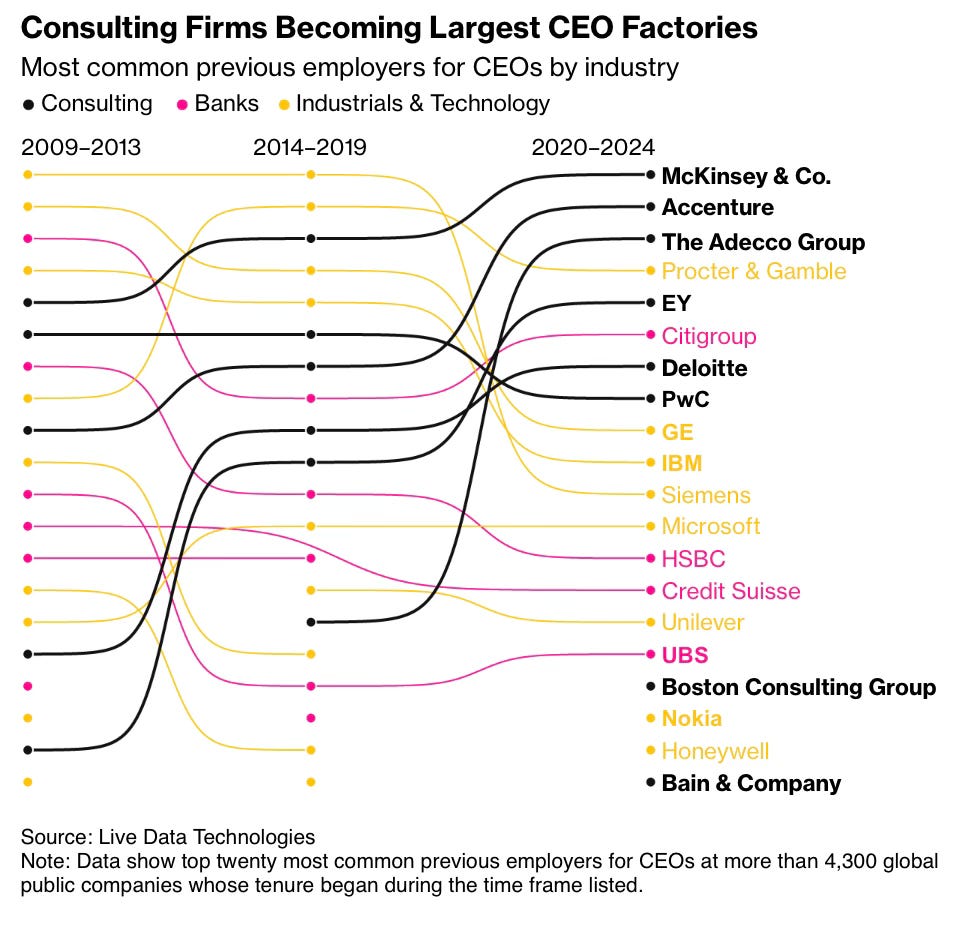Human Capital Intel - 6/4/25
Alternative talent development | Rethinking 1-1s | Businesses drop degree requirements | Engagement survey fatigue | Changing CEO pipelines
Welcome to the latest edition of Human Capital Intelligence, your weekly brief synthesizing over 250 leadership, HR, and people sources to filter out the noise. As always, we would love to hear from you at ken@reyvism.com with questions you’d like answered or topics covered.
Sent this by a friend? Sign up here to receive HCI in your inbox every week.
By Ken Stibler; Powered by Reyvism Analytics
Deep Dive:
As GenZ looks outside of white collar work, time nears to consider employee development competencies
The traditional pathway from college to white-collar employment is fracturing, with 42% of Gen Z workers now pursuing blue-collar roles. This shift reflects a fundamental and growing breakdown in the early-career hiring ladder that has historically fed corporate talent pipelines.
Gen Z workers increasingly view skilled trades as offering superior job security, higher pay, and immunity from technological displacement. A fire which Anthropic AI CEO Dario Amodei fanned last week, dropping the company’s claim that AI would have no effect on employment and instead warning that AI could now eliminate 10-20% of entry-level white-collar positions within five years
This generational pivot creates an immediate strategic imperative for businesses to reimagine their talent development frameworks. Traditional models that relied on a steady influx of junior white-collar workers to populate management tracks are becoming obsolete.
Companies will need to create parallel development pathways that cultivate leadership competencies across both technical trades and remaining white-collar functions, accommodating a risk-averse generation that prioritizes security over traditional advancement.
HR departments should immediately audit current leadership development programs and create separate competency tracks for skilled trades versus white-collar roles. This requires identifying transferable leadership skills, establishing mentorship programs that pair trade workers with senior management, and building accelerated promotion pathways for the smaller white-collar cohort who will assume greater responsibilities earlier.
Are 1-to-1s a solid bedrock for management?
The weekly one-on-one meeting, long considered a management fundamental, is under scrutiny, Bloomberg reports. Leaders like serial entrepreneur Howard Lerman and Nvidia CEO Jensen Huang are rejecting recurring 1:1s, arguing these scheduled check-ins create "management theater" that substitutes process for genuine collaboration.
Their pushback reflects growing concern that meeting-heavy cultures consume 40% of executive time while delivering questionable returns, prompting leaders to question whether calendar discipline actually improves team performance.
The evidence suggests a context-driven approach delivers superior results. Weekly 1:1s retain value for remote teams, underperforming employees requiring documentation, and managers lacking direct project involvement. However, co-located teams with high collaboration frequency achieve better outcomes through daily rapport-building and real-time feedback.
The key performance indicator isn't meeting frequency but management accessibility. Effective leaders report employees frequently seek impromptu guidance and they can typically accommodate these requests, indicating successful relationship management transcends calendar discipline.
Quote of the Week: “Right to disconnect” goes wrong
A report by the UK government found that Thomas Woldbye, the CEO of Heathrow airport, was uncontactable as his phone was on silent during March’s fire which left over 200,000 passengers stranded.
As Europe pushes towards laws that allow workers to ignore work communications after 5pm, Woldbye’s ‘deep regret’ demonstrates how the right to disconnect isn’t a luxury leaders have.
Reading List:
CEO factories change for corporate America to consultants
Once dominated by industrial titans like GE and P&G, the so-called “CEO factories” that once minted corporate leaders have given way to consulting firms as the new training grounds for tomorrow’s executives. Firms like McKinsey, Accenture, and Deloitte have stepped in, reshaping the leadership pipeline with professionals steeped in strategy, technology, and change management. Yet this shift carries risks, as the consulting sector’s recent scandals and the potential for “analysis paralysis” in the C-suite cast a shadow on its promise to consistently deliver decisive, effective CEOs.
Employees go numb to engagement surveys
Post-pandemic organizations increasingly rely on employee engagement surveys to measure morale. Yet, many workers have grown cynical, viewing these questionnaires as a box-ticking exercise rather than a genuine channel for change, Business Insider reports. Many employees see little follow-through, fueling perceptions that surveys exist more to placate than to improve workplace conditions. With survey fatigue rising and skepticism mounting, businesses risk spending heavily on morale metrics but receiving less signal and missing real opportunities to build trust.
Quarter of employers plan to drop degree requirements
25% of employers plan to drop bachelor’s degree requirements by the end of the year, according to a recent survey by Resume Templates. Hiring managers increasingly favor relevant skills, with 84% of firms that have removed degree requirements reporting success in broadening their talent pools and increasing diversity. This move coincides with GenZ’s growing skepticism about the value of college degrees amid rapid technological change.
Data Point: Cost of conflict
2.8 hours
The average amount of time employees spend dealing with conflict per week, costing U.S. employers an estimated $350 billion each year
In Other News:
As corporate boards pay CEOs similarly, company performance could take a hit, report finds. (HR Dive)
Duolingo CEO walks back AI-first comments: ‘I do not see AI as replacing what our employees do’. (Fortune)
Despite an increasing focus on skills-based hiring, most organizations still rely on resumes and job titles to evaluate talent, Hirevue says. (HR Dive)
More companies are letting workers cash in their vacation days. Should yours? (HR Brew)
Soaring healthcare costs driven by GLP-1s and mental health needs. (Employee Benefits News)
Half of Gen Z ChatGPT users say they view it as a co-worker, survey shows. (HR Dive)





